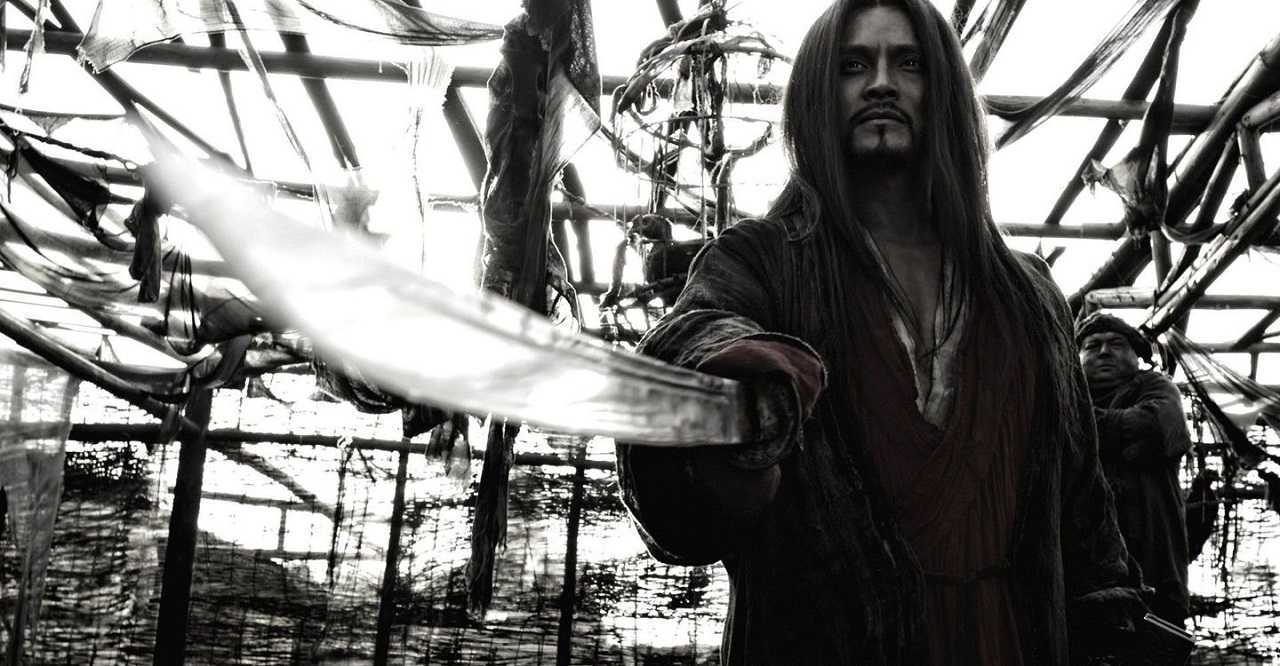(Dao Jian Xao)
China/USA. 2010.
Crew
Director – Wuershan, Screenplay – Ma Luoshan, Tang Que, Wuershan & Zhang Jiajia, Based on the Short Story Legend of the Kitchen Knife by An Changhe, Producers – Tang Xiu & Daniel Yu, Photography – Michal Tywoniuk, Music – Gong Geer & Dead J. Miquia, Visual Effects – M-Studio, Special Effects Supervisor – Huo Fengjing, Production Design – Hao Yi. Production Company – Fox International Productions/Taihe Universal Film Investment Co Ltd/First Cut Features Inc./Union Voole Technology Co. Ltd./Zixuxuanyang Cultural Development Co. Ltd/Bolong Investment Lo. Ltd/Fox International Productions (Greater China)/Zhongxunxincheng Advertising Co. Ltd/One Production Co. Ltd.
Cast
Liu Xiaoye (Chopper the Butcher), Ando Masanobu (Mute), Ashton Xu (Dugo Cheng), Mi Dan (Big Eight Chef), Kitty Zhang Yuqi (Madam Mei), You Benchang (Fat Tang), Senggerenquin (Big Beard)
Plot
A crude and piggish butcher becomes entranced with the prostitute Madam Mei after her handkerchief falls across his face. He makes repeated efforts to see her at the House of a Thousand Flowers but is rejected because he does not have enough money. At the South Beauty restaurant, the master chef is commissioned to make his special eight-course meal for the powerful Eunuch Liu. The chef auditions his apprentices to find a suitable heir. One apprentice is chosen but fearfully admits that the dish came about because of the accidental bumbling of a mute. The chef takes the mute on as his apprentice, teaching him his best skills. When it comes to the final meal of the apprenticeship, the mute serves the master a tasteless poison so that he can take his place and use the banquet as an opportunity to kill Eunuch Liu in revenge. Before he dies, the chef tells the story of his special cutting blade and how it was formed by Dugo Cheng, the son of a great warrior, from the metal of swords collected by his father, only to find that the metal had a curse that made it unable to kill anybody. At the House of a Thousand Flowers, Madam Mei finally agrees to marry the butcher after he kills a marauding warrior.
The Butcher, The Chef and the Swordsman was given a reasonable international release by 20th Century Fox where the advertising and promotion tried to sell it as another variant on the Wu Xia film as popularised by Crouching Tiger, Hidden Dragon (2000) and other international Chinese successes such as Zhang Yimou’s Hero (2002) and House of Flying Daggers (2004).
In truth though, this is exactly what The Butcher, The Chef and the Swordsman is not. Crouching Tiger, Hero et al are lushly romantic costume fantasies; The Butcher, The Chef and the Swordsman comes with a few billowing silks but is mostly dirty, grimy and filled with discordantly cluttered texture. Where these others make a virtue of their sweeping martial arts moves and flights of pure fantasy, The Butcher, The Chef and the Swordsman features a handful of brief swordfight scenes, nothing that stands out in any way. While these other films were great romances, the characters here are frequently caricatures of the fat and repulsive that turn up in Chinese cinema – the character of Eunuch Liu looking for all the world like Jabba the Hut in grotesque geisha makeup.
The Butcher, The Chef and the Swordsman is visually cluttered and dense, filled with wildly over-the-top caricatures so much so that I spent a good part of the film trying to get a handle on it and work out where it was going. I am not sure in the end I ever achieved that goal. The film is divided into several chapters, each of which tells a different story about one character. You finally gather that this is intended as some equivalent of the narrative structure of Pulp Fiction (1994) – a series of separate and non-linear stories that overlap.

The only one of these stories that I felt came to life in any way was the segment regarding the mute who becomes apprentice to the master chef and then creates the banquet as part of a cleverly wound plot to assassinate Eunuch Liu. Here there is a fine sense of the formalism and just the right degree of larger-than-life embellishment that takes place in Crouching Tiger, Hero etc. The final story about the butcher’s marriage to the prostitute comes with a downer of a twist ending that involves another of the elaborate charades we get in Chinese fantasy.
Rather than any lush sweep, director Wuershan leaps in with elements of the bizarre. Everything from the prostitutes rapping songs about eating, flashbacks in sketchy hand-drawn animation to wacky graphics that cut away to offer animated diagrams of how people were killed, even a fight sequence that turns into a videogame at one point. I am not exactly sure what any of these add to the film. If anything, it serves to turn The Butcher, The Chef and the Swordsman into some bizarre Wu Xia equivalent of Scott Pilgrim vs. the World (2010).
Mongolian-born director Wuershan stayed in genre material with his subsequent films Painted Skin: The Resurrection (2012), The Ghouls (2015), Fengshen Trilogy (2020) and full-blown venture into epic Wu Xia with Creation of the Gods I: Kingdom of Storms (2023).
Trailer here


